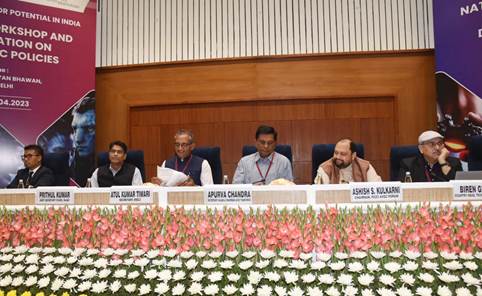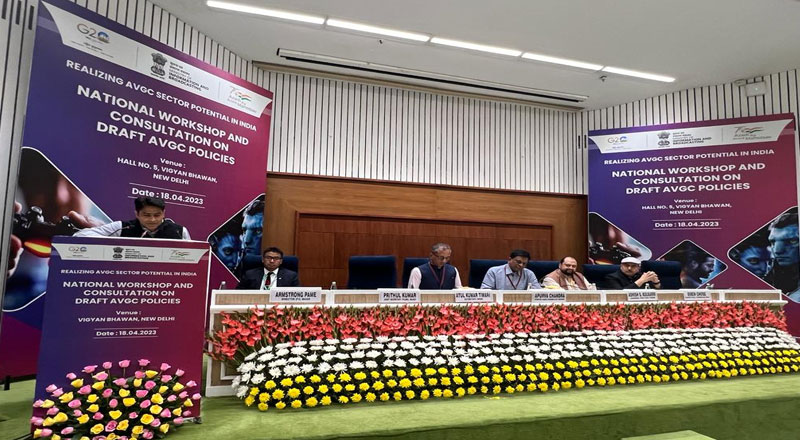The Ministry of Information and Broadcasting today organized the First National Workshop and Consultation on Draft AVGC Policies at Vigyan Bhawan, New Delhi, for industry, academia & the government. There was forthcoming participation from several Government bodies of both Centre & State level related to AVGC, along with the industry associations & industry leaders of the AVGC sector.

The workshop was inaugurated by Shri Apurva Chandra, Secretary, Ministry of I&B and Chairman AVGC Taskforce. He spoke about the Ministry’s efforts to strengthen the AVGC (Animation, Visual Effects, Gaming & Comics – Extended Reality) sector in India and emphasised that the States also put in their best efforts to benefit from the growth of the AVGC sector.
Shri Apurva Chandra, Secretary, Ministry of I&B, in his inaugural address spoke about multiple enablers of the AVGC sector, with Education and Skilling being among the sector’s core pillars. He said that the AVGC sector has witnessed unprecedented growth rate in the recent times and is expected to grow exponentially in the coming decade. The Secretary also highlighted that it is imperative to give the right kind of exposure to our children at the right age, so that they have an opportunity to hone their creative skills and make a career in this sector, for which the draft policy lays equal emphasis on skilling and education.
Underlining the scope of the industry in future Shri Chandra said that AVGC is today in a place where Indian IT sector was in 2000s. The IT sector has grown to become a substantial contributor in the world and the same potential resides in the AVGC sector, he added, noting that major movies in Hollywood today involve skill and manpower from India. He also laid emphasis on the need for stakeholders to work together to ensure provision of right kind of skilling infrastructure to the talent in this sector.
He further highlighted role of States in fulfilling the AVGC dream of the country. He recognised the role of States in magnifying the efforts and mobilizing the resources necessary to promote the sector is paramount. The Secretary stressed on creation Regional Centers for Excellence and noted the steps taken by Karnataka in this direction with a number of startups already part of the Center.
Shri Atul Kumar Tiwari, Secretary, Ministry of Skill Development and Entrepreneurship, explained the need for facilitating future-ready skilling in the sector, for making India a go-to hub in the AVGC space. He also highlighted the significance of establishing robust physical infrastructure that would aid in the learning and development of a student. The MSDE has identified that skilling initiative will be critical to the growth of the AVGC sector and is committed to taking best efforts to provide the skilling ecosystem.
Some lighthouse States of AVGC shared their learnings and best practices during the course of the workshop, which is envisaged to provide guidance to other states, including helping them in drafting state-level AVGC policies. The sessions covered during the workshop are envisioned to help states gain clarity on various aspects of the State AVGC policy, thereby enabling them in drafting state level policies.
Representatives of various leading companies and industry bodies working in the M&E and AVGC-XR space participated in the workshop and shared their insights on promoting the sector in the country.
This National Workshop was organized with the primary objective of disseminating the Model State policy to the States for its customization & adoption. It also provided a platform for discussions on the Draft National Policy to align it to the needs of its stakeholders. Further the workshop witnessed a session on showcasing the best practices being followed for promoting the AVGC sector by certain States. The workshop was closed by Concluding Remarks and vote of thanks from Shri Prithul Kumar, Joint Secretary (Films), Ministry of I&B.
The AVGC Promotion Task Force was constituted under the Chairmanship of Secretary, Ministry of I & B, Shri Apurva Chandra. It has submitted its report in December 2022, which has been adopted as the guidance document for steps to be taken. It also has Draft of National Policy & Model Policy for the States.





